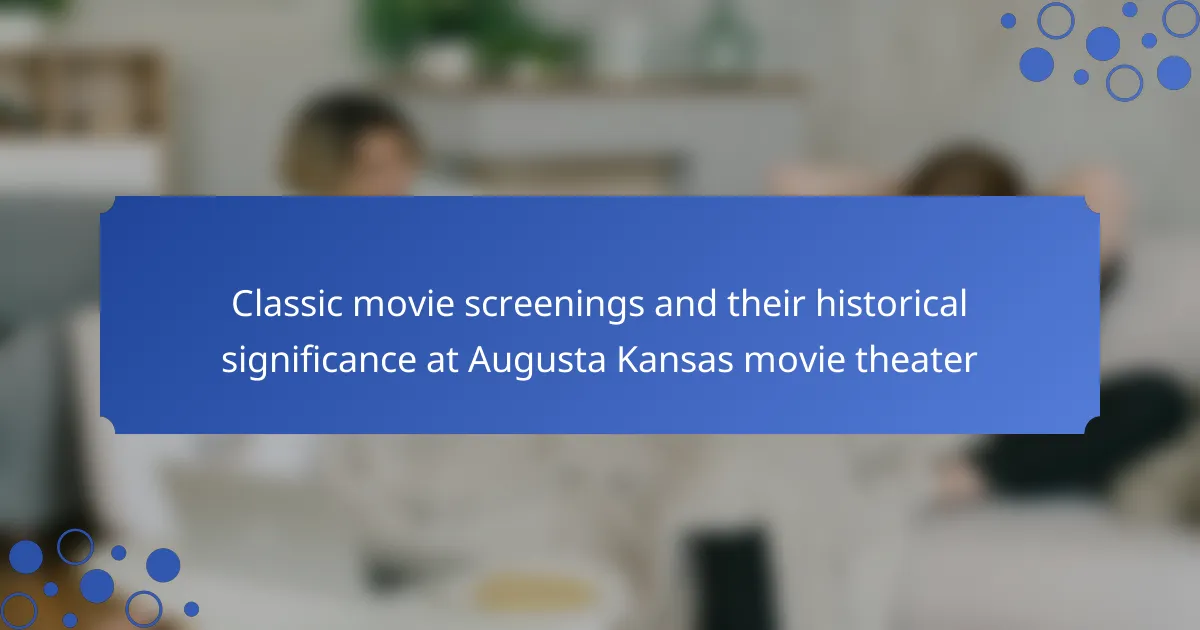Classic movie screenings are organized events where historically significant or culturally influential films are shown to audiences, often in communal settings such as theaters or outdoor venues. The Augusta Kansas movie theater, a cultural landmark established in the early 20th century, plays a vital role in preserving cinematic history by hosting these screenings. These events not only celebrate classic films but also facilitate discussions on their impact, engaging the community and introducing new audiences to essential works of cinema. Screenings are scheduled regularly, with selections based on audience interest and historical relevance, ensuring a nostalgic experience that honors the legacy of classic films.

What are classic movie screenings?
Classic movie screenings are events where classic films are shown to audiences. These screenings often feature films that are historically significant or culturally influential. They provide an opportunity for viewers to experience cinematic classics in a communal setting. Classic movie screenings can take place in theaters, outdoor venues, or special events. They often include discussions or presentations about the film’s impact. The practice of screening classic films dates back to the mid-20th century. Many theaters, like those in Augusta, Kansas, host these events to celebrate film history. These screenings help preserve the legacy of important films and introduce them to new audiences.
How do classic movie screenings differ from regular screenings?
Classic movie screenings differ from regular screenings primarily in their focus on films from earlier decades. These screenings often feature films that are considered classics, such as those from the Golden Age of Hollywood. The presentation of classic films may include restored versions or original prints, enhancing the viewing experience.
Additionally, classic movie screenings often create a nostalgic atmosphere, attracting audiences who appreciate film history. The audience demographic may differ, with older viewers or film enthusiasts more likely to attend.
Regular screenings typically focus on current releases and mainstream films, catering to contemporary tastes. In contrast, classic screenings may include discussions or events that provide context about the film’s historical significance.
These factors contribute to a unique experience that celebrates cinema’s legacy, distinguishing classic screenings from standard movie showings.
What criteria define a movie as a classic?
A movie is defined as a classic when it demonstrates enduring popularity and cultural significance. Classics often feature exceptional storytelling, innovative direction, and memorable performances. They frequently address universal themes that resonate across generations. Critical acclaim and recognition by film institutions also contribute to a film’s classic status. For example, films like “Casablanca” and “Gone with the Wind” are often cited for their lasting impact on cinema. The American Film Institute has included many classics in its lists, reinforcing their importance in film history. These criteria help establish a film’s legacy and influence over time.
What genres are commonly featured in classic movie screenings?
Classic movie screenings commonly feature genres such as drama, comedy, romance, and thriller. These genres represent a wide range of storytelling that appeals to diverse audiences. Historical data shows that classic dramas often include films from the Golden Age of Hollywood, like “Gone with the Wind.” Comedies, such as “Some Like It Hot,” are also frequently showcased. Romance films, including “Casablanca,” remain popular due to their timeless themes. Thrillers, exemplified by “Psycho,” often capture audience interest with suspenseful narratives. This variety in genres enhances the cultural experience of classic movie screenings.
Why are classic movie screenings significant in cultural history?
Classic movie screenings are significant in cultural history because they preserve and celebrate cinematic heritage. They provide audiences with access to films that shaped societal norms and artistic expression. These screenings often foster community engagement and nostalgia. They create a shared experience that connects generations through storytelling. Historical films can reflect cultural values and social issues of their time. For example, classic films like “Casablanca” and “Gone with the Wind” offer insights into World War II and the American South, respectively. Furthermore, they encourage discussions about film techniques and the evolution of cinema. Classic screenings also support local theaters, contributing to cultural tourism and economic vitality.
How do classic films reflect the social values of their time?
Classic films reflect the social values of their time by portraying the prevailing attitudes, beliefs, and norms of society. These films often address contemporary issues such as race, gender roles, and economic conditions. For example, films from the 1950s often depicted traditional family structures, aligning with the post-war societal expectations. In contrast, films from the 1960s began to challenge these norms, reflecting the rise of counterculture movements. Historical context reveals that classic films serve as a mirror, showcasing the struggles and aspirations of their audiences. The portrayal of characters and storylines often aligns with significant historical events, such as the civil rights movement or the feminist movement. This alignment provides insight into how society viewed itself and its values during specific eras. Overall, classic films serve as valuable cultural artifacts that encapsulate the zeitgeist of their respective times.
What role do classic movie screenings play in film preservation?
Classic movie screenings play a vital role in film preservation. They provide a platform for audiences to experience historical films in their original format. This exposure fosters appreciation for cinematic heritage. Additionally, screenings often include discussions or lectures that educate viewers on the film’s context. Such events can raise awareness about the importance of preserving these works. Furthermore, classic screenings can lead to increased funding for restoration projects. Organizations like the Library of Congress support preservation efforts through public screenings. Overall, classic movie screenings serve as both a celebration and a means of safeguarding film history.

What is the historical significance of the Augusta Kansas movie theater?
The Augusta Kansas movie theater holds historical significance as a cultural landmark in the region. It has served as a community gathering place since its establishment in the early 20th century. The theater has hosted numerous classic film screenings, contributing to the preservation of cinematic history. It played a vital role in introducing residents to the evolving world of film. Over the decades, the theater has witnessed significant social changes and community events. Its architecture reflects the design trends of its time, making it a notable example of historical preservation. The theater’s ongoing operation highlights the importance of local entertainment venues in maintaining community identity.
How has the Augusta Kansas movie theater evolved over the years?
The Augusta Kansas movie theater has undergone significant changes over the years. Initially, it operated as a single-screen venue showcasing films from the early 20th century. Over time, it transitioned to a multi-screen format to accommodate diverse audiences and film genres. Technological advancements have led to the adoption of digital projection systems, enhancing the viewing experience. The theater has also adapted its programming to include classic movie screenings, attracting nostalgia-driven audiences. Community involvement has played a key role in its evolution, with local events and film festivals being hosted. Historical records indicate that the theater has remained a cultural hub in Augusta, reflecting changing entertainment trends. These adaptations have ensured its relevance in the community while preserving its historical significance.
What milestones mark the history of the Augusta Kansas movie theater?
The Augusta Kansas movie theater has several key milestones in its history. It originally opened in 1926, serving as a central entertainment venue. The theater underwent renovations in the 1950s, modernizing its facilities. In the 1970s, it transitioned to showing second-run films, attracting budget-conscious audiences. The theater was closed in 2003 due to declining attendance. A community effort led to its reopening in 2010, revitalizing local interest in classic films. Today, it hosts special screenings, celebrating its historical significance in Augusta.
How has the theater adapted to changes in the film industry?
The theater has adapted to changes in the film industry by diversifying its offerings. It now features classic movie screenings alongside new releases. This strategy attracts different audiences and honors film history. The incorporation of themed events and special screenings has also become common. Many theaters have upgraded their technology to enhance the viewing experience. For instance, improved sound systems and high-definition projection are now standard. Theaters often collaborate with film festivals to showcase unique content. These adaptations help theaters remain relevant in a competitive market.
What community impact does the Augusta Kansas movie theater have?
The Augusta Kansas movie theater serves as a cultural hub for the community. It provides a venue for classic movie screenings, fostering community engagement. This theater hosts events that bring residents together, enhancing social connections. It also supports local businesses by attracting visitors who dine and shop nearby. The theater contributes to the local economy through job creation and tourism. It preserves local history by showcasing classic films that resonate with the community’s heritage. Additionally, the theater offers educational opportunities through film discussions and events. Overall, the Augusta Kansas movie theater plays a vital role in enriching community life.
How does the theater contribute to local culture and events?
The theater contributes to local culture and events by serving as a community hub for artistic expression. It hosts various performances that reflect local stories and traditions. The theater also provides a platform for local artists to showcase their work. This engagement fosters a sense of community pride and identity. Additionally, the theater organizes events that bring together diverse audiences. Such events often include film screenings, live performances, and cultural festivals. These activities enhance social interaction and cultural exchange among residents. Historical data shows that theaters often play a vital role in preserving local heritage through storytelling.
What role does the theater play in community engagement?
Theater plays a vital role in community engagement by fostering social interaction. It serves as a platform for cultural expression and shared experiences. Local theaters often host performances that reflect community values and stories. This helps strengthen community identity and pride. Additionally, theaters provide opportunities for collaboration among artists, educators, and residents. Events like classic movie screenings can unite diverse audiences. They promote dialogue and understanding among different community groups. Historical significance is also emphasized as theaters preserve local heritage through storytelling.

How are classic movie screenings organized at the Augusta Kansas movie theater?
Classic movie screenings at the Augusta Kansas movie theater are organized through a scheduled program. The theater selects classic films based on audience interest and historical significance. Screenings typically occur weekly or monthly, depending on the film lineup. Tickets are often sold in advance to manage attendance. The theater may also host themed events or discussions related to the films. Promotion is done through local advertising and social media to attract attendees. Community feedback helps shape future screenings, ensuring relevance and engagement. The theater aims to create a nostalgic experience that honors classic cinema.
What types of classic films are typically screened?
Classic films typically screened include timeless genres such as musicals, dramas, comedies, and westerns. Musicals often feature iconic songs and dance numbers, captivating audiences with their vibrant performances. Dramas showcase powerful storytelling and character development, often reflecting societal issues of their time. Comedies provide humor and entertainment, appealing to a wide range of viewers. Westerns depict tales of adventure and morality in the American frontier, highlighting cultural themes. These classic films are selected for their historical significance and enduring popularity, making them ideal for screenings.
How are selections made for classic movie screenings?
Selections for classic movie screenings are made based on audience preferences and historical significance. Curators often analyze viewer feedback and attendance data. They consider films that have had a lasting cultural impact. Additionally, films that celebrate anniversaries or notable events are prioritized. Factors like genre diversity and representation are also taken into account. The goal is to create a well-rounded lineup that resonates with the community. Research indicates that audience engagement increases when selections reflect local interests. This approach ensures that screenings are both entertaining and educational.
What special events accompany classic movie screenings?
Special events that accompany classic movie screenings often include themed discussions and guest speakers. These events provide insights into the film’s historical context. Additionally, live music performances may enhance the viewing experience. Some screenings feature costume contests related to the film. Pre-show activities can include trivia games and interactive exhibits. Q&A sessions with film historians or critics are also common. These events foster community engagement and enrich the audience’s appreciation of classic cinema. Many theaters promote these events to attract larger crowds and create a festive atmosphere.
What challenges do classic movie screenings face in Augusta?
Classic movie screenings in Augusta face challenges such as limited audience interest and competition from modern entertainment options. Many residents prefer contemporary films or streaming services, which reduces attendance. Additionally, the aging infrastructure of local theaters can hinder the viewing experience. High operational costs also pose a financial challenge for theaters screening classic films. Furthermore, securing licensing rights for older films can be complicated and expensive. These factors collectively impact the sustainability of classic movie screenings in Augusta.
How does audience engagement affect the success of screenings?
Audience engagement significantly influences the success of screenings. High levels of engagement lead to increased attendance and enthusiasm. Engaged audiences are more likely to promote screenings through word-of-mouth. This organic promotion can attract new viewers. Additionally, engaged audiences enhance the overall atmosphere of the screening. A lively audience can create a memorable experience for all attendees. Studies show that screenings with active audience participation often receive higher satisfaction ratings. This satisfaction can translate into repeat attendance for future events.
What logistical issues arise when organizing classic movie screenings?
Logistical issues when organizing classic movie screenings include securing film rights, arranging equipment, and managing venue capacity. Securing film rights is essential to legally show the movie. This process can involve negotiations with studios or distributors. Arranging equipment involves ensuring that projectors and sound systems are compatible with the film format. Managing venue capacity is crucial to comply with safety regulations and maximize attendance. Additionally, coordinating schedules with staff and volunteers is necessary for smooth operations. Marketing the event effectively can also present challenges, as reaching the target audience requires strategic planning. Lastly, ensuring adequate seating and comfort for attendees is vital for a positive experience.
What practical tips can enhance the experience of attending classic movie screenings?
Arriving early enhances the experience of attending classic movie screenings. This allows time to find good seating and soak in the theater’s atmosphere. Engaging with fellow attendees fosters a sense of community. Bringing a notebook or journal can help capture thoughts about the film. Familiarizing oneself with the film’s background enhances appreciation. Participating in pre-screening discussions can deepen understanding. Enjoying themed snacks or drinks can make the experience more enjoyable. Dressing in period-appropriate attire can add to the immersive experience.
Classic movie screenings at the Augusta Kansas movie theater serve as a significant cultural event, showcasing historically important films that reflect societal values and artistic expression. These screenings differ from regular showings by focusing on classic films from earlier decades, often accompanied by discussions that enhance audience understanding. The theater has evolved over the years, adapting its programming to include classic films while fostering community engagement and preserving cinematic heritage. Additionally, logistical challenges and audience engagement play crucial roles in the success of these screenings, highlighting their importance in maintaining local culture and history.
